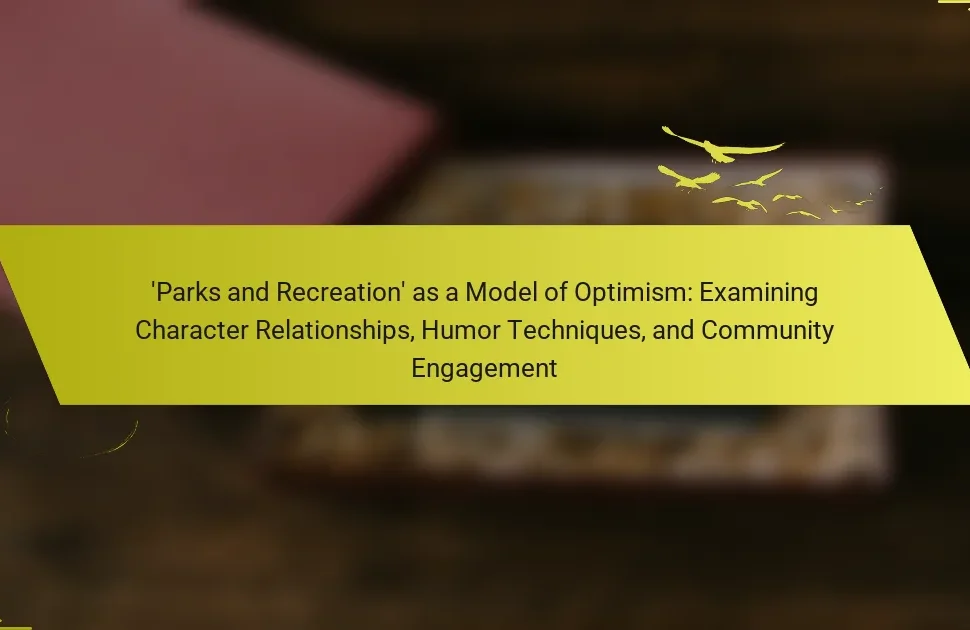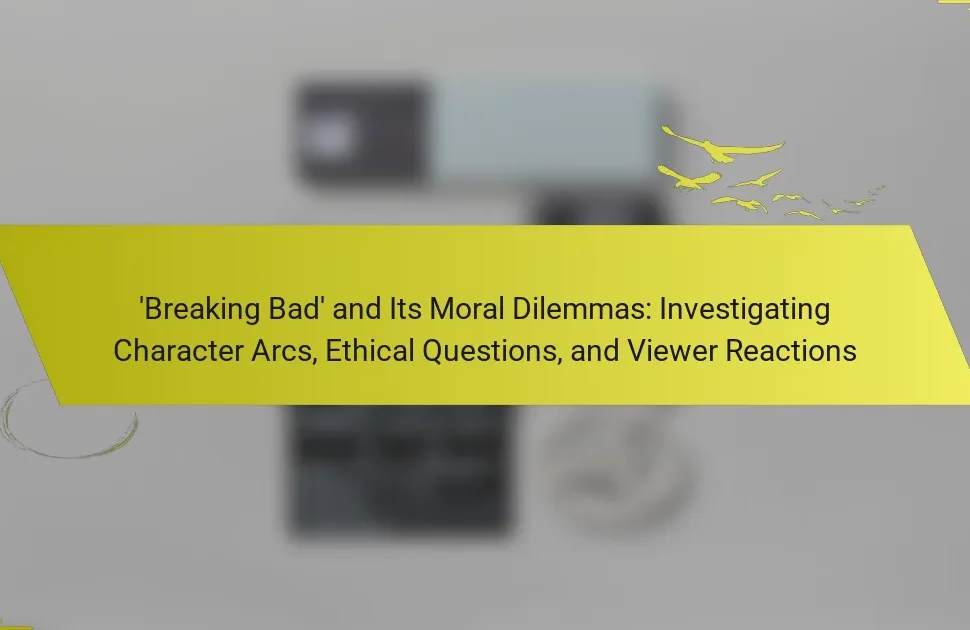The article examines the legacy of the television series ‘M*A*S*H,’ which aired from 1972 to 1983, and its significant impact on American television. It highlights how ‘M*A*S*H’ skillfully combined comedy and drama to explore serious themes such as the absurdity of war, human relationships, and morality. The series is noted for its character development, particularly figures like Hawkeye Pierce and Margaret Houlihan, who became cultural icons. The article also discusses the show’s evolution over its run, addressing complex social issues and setting a new standard for character-driven storytelling in television. The enduring influence of ‘M*A*S*H’ is underscored by its record-breaking series finale, which remains one of the most-watched episodes in TV history.

What is the Legacy of ‘M*A*S*H’?
The legacy of ‘M*A*S*H’ is significant in American television history. It blended comedy and drama to address serious themes of war. The show aired from 1972 to 1983, gaining critical acclaim and a dedicated fanbase. It tackled issues like the absurdity of war, human relationships, and morality. The series finale remains one of the most-watched television episodes, viewed by over 105 million people. ‘M*A*S*H’ influenced future shows by incorporating humor into serious topics. Its characters, like Hawkeye Pierce and Margaret Houlihan, became cultural icons. The series is often cited for its innovative storytelling and character development.
How did ‘M*A*S*H’ redefine humor in war contexts?
‘M*A*S*H’ redefined humor in war contexts by blending comedy with serious themes. The show presented the absurdities of war through satirical storytelling. Characters like Hawkeye Pierce used humor to cope with trauma and chaos. This approach allowed audiences to engage with difficult subjects like mortality and ethics. The series often highlighted the contrast between military bureaucracy and human compassion. It used laughter as a tool for critique, challenging traditional war narratives. By portraying the emotional struggles of medical personnel, ‘M*A*S*H’ humanized soldiers in a unique way. This blend of humor and pathos influenced future war-related media, establishing a new paradigm for storytelling in conflict settings.
What specific comedic elements were used in ‘M*A*S*H’?
‘M*A*S*H’ utilized several specific comedic elements, including satire, dark humor, and character-driven comedy. Satire was employed to critique military bureaucracy and the absurdity of war. Dark humor highlighted the grim realities of life in a war zone while maintaining comedic undertones. Character-driven comedy relied on the unique personalities of the ensemble cast, showcasing their interactions and relationships. The use of irony often underscored the contrast between the characters’ jovial behavior and the serious backdrop of war. Additionally, physical comedy provided levity in tense situations, balancing humor with poignant moments. These elements combined to create a rich tapestry of comedy that resonated with audiences.
How did the show’s humor impact perceptions of war?
The show’s humor significantly altered perceptions of war by humanizing the experiences of soldiers. It portrayed the absurdity of military life and the chaos of conflict. This comedic lens allowed viewers to process the harsh realities of war in a more relatable manner. By blending humor with serious themes, the show highlighted the emotional struggles faced by individuals. For instance, characters often used jokes to cope with trauma and stress. This approach fostered empathy among audiences towards the soldiers’ plight. Research has shown that humor can serve as a coping mechanism in stressful situations. The show’s impact on public perception contributed to a more nuanced understanding of war’s complexities.
What character relationships are central to ‘M*A*S*H’?
The central character relationships in ‘M*A*S*H’ include the camaraderie between Hawkeye Pierce and Trapper John McIntyre. Their friendship epitomizes the bond formed under the stress of war. Another key relationship is between Hawkeye and Margaret “Hot Lips” Houlihan, which evolves from conflict to mutual respect. The dynamic between B.J. Hunnicutt and Hawkeye further highlights the themes of friendship and loyalty. Additionally, the interactions between Colonel Henry Blake and his staff showcase the challenges of leadership in a wartime setting. These relationships contribute to the show’s exploration of humor and humanity amidst the harsh realities of war.
How do the dynamics between characters reflect real-life relationships?
The dynamics between characters in ‘M*A*S*H’ reflect real-life relationships through their interactions and conflicts. Characters exhibit a range of emotions, just like people in real life. The humor often masks deeper issues, akin to how individuals use humor to cope with stress. Relationships evolve over time, mirroring the complexities of real friendships and partnerships. For example, the camaraderie among the staff highlights loyalty and support during adversity. Conflicts between characters, such as Hawkeye and Frank, illustrate differing values and perspectives, similar to real-world disagreements. Overall, the show’s character dynamics serve as a microcosm of real-life relationships, showcasing both humor and depth.
What role does camaraderie play in the show’s narrative?
Camaraderie serves as a central theme in the narrative of ‘M*A*S*H’. It illustrates the bonds formed between characters amid the chaos of war. These relationships provide emotional support and levity in dire situations. The show emphasizes teamwork and friendship as essential for coping with trauma. Characters rely on each other for both practical help and emotional resilience. This camaraderie often manifests in humor, showcasing how laughter can strengthen connections. The portrayal of these relationships reflects the reality of military life, highlighting the importance of solidarity. Overall, camaraderie enriches the narrative by demonstrating the human capacity for connection in challenging circumstances.
How does ‘M*A*S*H’ serve as a cultural reflection?
‘M*A*S*H’ serves as a cultural reflection by addressing the absurdities of war and its impact on human relationships. The show uses humor to critique military bureaucracy and the Vietnam War’s realities. It presents characters grappling with moral dilemmas, showcasing the emotional toll of conflict. The series highlights issues like anti-war sentiment and the quest for peace during a turbulent era. Its portrayal of camaraderie among diverse characters illustrates shared humanity amidst chaos. The show’s blend of comedy and drama resonates with audiences, making it a poignant commentary on the human condition in wartime.
What social issues does ‘M*A*S*H’ address through its storytelling?
‘M*A*S*H’ addresses various social issues including war, mental health, and gender roles. The series critiques the absurdity of war and its impact on soldiers. It highlights the psychological toll of combat through characters dealing with trauma. The show also explores gender dynamics, showcasing strong female characters in a male-dominated environment. Additionally, it comments on medical ethics and the challenges faced by healthcare professionals in wartime. The use of humor serves to illuminate these serious topics, making them accessible to viewers. Overall, ‘M*A*S*H’ combines comedy with poignant social commentary, reflecting the complexities of life during war.
How did the show influence public opinion on the Vietnam War?
The show “M*A*S*H” significantly influenced public opinion on the Vietnam War by presenting the harsh realities of war through humor and satire. It humanized soldiers and depicted the absurdity of military bureaucracy. The series aired during a time of growing anti-war sentiment in the United States. It challenged traditional portrayals of war by highlighting its emotional and physical toll. Episodes often addressed themes of morality and the impact of war on individuals. Viewers connected with characters who faced difficult moral dilemmas. This connection fostered empathy and critical thinking about the Vietnam War. Consequently, “M*A*S*H” contributed to a shift in public perception, making audiences more skeptical of military actions.
What are the key themes explored in ‘M*A*S*H’?
The key themes explored in ‘M*A*S*H’ include the absurdity of war, the importance of camaraderie, and the impact of humor in difficult situations. The show highlights the chaos and tragedy of the Korean War through dark humor. It emphasizes how relationships among characters provide support amidst the horrors of war. The series also reflects on the moral dilemmas faced by medical personnel in combat. Additionally, ‘M*A*S*H’ critiques military bureaucracy and the futility of war. These themes resonate with audiences, showcasing the human experience in extreme circumstances. The show’s blend of comedy and drama allows for a nuanced exploration of serious topics.
How does ‘M*A*S*H’ balance comedy and tragedy?
‘M*A*S*H’ balances comedy and tragedy through its unique storytelling approach. The show juxtaposes humorous situations with the grim realities of war. Characters often use humor as a coping mechanism for stress and trauma. This blend highlights the absurdity of their circumstances while acknowledging the serious consequences of conflict. For example, episodes frequently feature comedic banter amidst life-and-death medical scenarios. The show’s writers skillfully crafted dialogue that interwove laughter with poignant moments. This balance allows the audience to engage with both the lighthearted and serious themes. Ultimately, ‘M*A*S*H’ reflects the complexity of human experience in wartime.
What recurring motifs can be found throughout the series?
Recurring motifs in ‘M*A*S*H’ include the absurdity of war, camaraderie among soldiers, and the impact of humor on coping. The series frequently highlights the chaos and irrationality of military life. This is depicted through surreal situations and dark comedy. Camaraderie is shown in the strong bonds between characters, emphasizing friendship and support. Humor serves as a crucial coping mechanism for the characters. This motif reflects the real-life experiences of soldiers during the Korean War. The series often contrasts the harsh realities of war with comedic relief. This duality enhances the emotional depth of the narrative. Overall, these motifs contribute to the show’s lasting legacy.

How did ‘M*A*S*H’ evolve over its run?
‘M*A*S*H’ evolved significantly from its debut in 1972 to its conclusion in 1983. Initially, the series focused on lighthearted comedy amidst the serious backdrop of the Korean War. As the series progressed, it integrated more dramatic elements and explored deeper themes like the psychological effects of war. Character development became a priority, showcasing complex relationships and personal struggles. The show addressed social issues, including race and gender, reflecting contemporary cultural shifts. By its final seasons, ‘M*A*S*H’ had transitioned to a more poignant tone, blending humor with profound commentary on the human condition. The series finale, “Goodbye, Farewell and Amen,” remains one of the most-watched television episodes, highlighting its lasting impact and evolution in storytelling.
What changes occurred in character development throughout the series?
Character development in ‘M*A*S*H’ evolved significantly over the series. Characters transitioned from comedic archetypes to complex individuals. For instance, Hawkeye Pierce started as a carefree surgeon. As the series progressed, he revealed deeper emotional struggles related to war. Similarly, Margaret Houlihan transformed from a strict authority figure to a more sympathetic character. This shift highlighted her vulnerabilities and personal growth. Additionally, characters like Frank Burns displayed a decline in their moral compass, emphasizing the impact of war on personality. Overall, the series portrayed a nuanced exploration of how war shaped the characters’ identities and relationships.
How did the show’s tone shift in later seasons?
The show’s tone shifted to a more serious and dramatic focus in later seasons. Early seasons emphasized humor and lightheartedness amidst war. As the series progressed, it tackled deeper themes such as loss, trauma, and the futility of war. This change reflected societal attitudes towards the Vietnam War and contemporary issues. Episodes increasingly featured emotional storylines and character development. The balance between comedy and drama became more pronounced. This evolution contributed to the show’s critical acclaim and lasting impact.
Why is ‘M*A*S*H’ still relevant today?
‘M*A*S*H’ remains relevant today due to its exploration of the absurdities of war and human relationships. The series uses humor to address serious themes, making it a powerful commentary on the human condition. Its characters, such as Hawkeye and Margaret, embody complex personalities that resonate with audiences. The show’s ability to blend comedy with poignant moments creates a timeless appeal. Additionally, ‘M*A*S*H’ reflects societal issues that persist, such as mental health and the impact of conflict. The series has influenced numerous shows and remains a reference point in discussions about war and comedy. Its legacy continues to inspire new generations, showcasing the enduring relevance of its themes.
What lessons can modern audiences learn from ‘M*A*S*H’?
Modern audiences can learn about the complexities of human relationships from ‘M*A*S*H’. The show highlights the importance of camaraderie in difficult situations. It portrays how humor can be a coping mechanism during war. Characters navigate personal struggles while maintaining their bonds. This reflects the necessity of support systems in times of crisis. Additionally, ‘M*A*S*H’ addresses the absurdity of war. It encourages viewers to question authority and societal norms. The series promotes empathy by showcasing diverse perspectives on conflict. Overall, it teaches resilience and the value of connection amidst chaos.

What impact did ‘M*A*S*H’ have on television and beyond?
‘M*A*S*H’ revolutionized television by blending comedy with serious themes. It introduced a new narrative style that addressed complex social issues. The show tackled topics like war, ethics, and human relationships. Its unique mix of humor and drama influenced future sitcoms. ‘M*A*S*H’ set a precedent for character-driven storytelling in television. The series finale remains one of the most-watched episodes in TV history, drawing over 105 million viewers. Its cultural impact extended beyond entertainment, shaping public perceptions of the Vietnam War. The show has been praised for its innovative approach to storytelling and character development.
How did ‘M*A*S*H’ influence other television shows?
‘M*A*S*H’ influenced other television shows by pioneering the blend of comedy and drama in a war setting. It introduced the concept of using humor to address serious themes. This approach allowed for deeper character development and emotional resonance. Many shows that followed, such as ‘Scrubs’ and ‘The Office,’ adopted similar formats. They combined humor with poignant moments, creating a balance that resonated with audiences. ‘M*A*S*H’ also set a precedent for ensemble casts, influencing how future shows structured their character dynamics. Its legacy is evident in how contemporary series tackle complex issues through humor. Overall, ‘M*A*S*H’ reshaped television storytelling, making it more relatable and impactful.
What legacy did the show leave for future war-themed comedies?
‘M*A*S*H’ established a significant legacy for future war-themed comedies by blending humor with serious themes. The show addressed the absurdities of war while maintaining character depth and emotional resonance. Its unique approach influenced later series to incorporate humor as a coping mechanism for trauma. The show’s success demonstrated that comedy could effectively tackle sensitive subjects. This paved the way for future productions to explore similar themes in a more nuanced manner. Additionally, ‘M*A*S*H’ set a standard for character-driven storytelling in the genre. This legacy continues to inspire creators in balancing humor with poignant social commentary.
What can viewers take away from ‘M*A*S*H’ today?
Viewers can take away insights on the complexities of war and human relationships from ‘M*A*S*H’ today. The show blends humor with serious themes, illustrating the absurdity of conflict. It highlights the importance of camaraderie and resilience among individuals facing adversity. Characters like Hawkeye and BJ demonstrate the necessity of humor as a coping mechanism. The series also reflects societal attitudes towards war and mental health, promoting dialogue on these issues. Its portrayal of ethical dilemmas remains relevant, encouraging viewers to think critically about morality in challenging situations. Overall, ‘M*A*S*H’ serves as a poignant reminder of the human experience in times of crisis.
How can the humor in ‘M*A*S*H’ be applied to contemporary issues?
The humor in ‘M*A*S*H’ can be applied to contemporary issues by highlighting the absurdity of war and the human condition. The show used satire to address serious topics like trauma and ethics in medicine. This approach remains relevant as modern conflicts still involve similar dilemmas. For instance, the show’s characters often employed humor to cope with stress, reflecting how individuals today use humor in crisis situations. Studies show that humor can serve as a psychological tool for resilience. By portraying the camaraderie among characters, ‘M*A*S*H’ emphasizes the importance of relationships during tough times, a theme that resonates in today’s social dynamics.
What are best practices for analyzing humor in serious contexts?
Best practices for analyzing humor in serious contexts include understanding the audience’s sensitivities. Contextual awareness is crucial to avoid offending or trivializing serious issues. Analyzing the intent behind the humor helps clarify its purpose. Identifying cultural references enhances comprehension of the humor’s impact. Examining character dynamics provides insight into relational humor. Recognizing timing and delivery is essential for effective humor analysis. Evaluating the balance between humor and seriousness informs the overall message. Research indicates that humor can serve as a coping mechanism in serious contexts, promoting resilience and connection among individuals.
The main entity of the article is the television series ‘MASH’, which is recognized for its significant legacy in American television history. The article explores how ‘MASH’ blended comedy and drama to address serious themes of war, human relationships, and morality, ultimately influencing future shows. It examines the show’s impact on public perception of war, character relationships, and its reflection of societal issues, including mental health and gender roles. Key themes such as camaraderie, the absurdity of war, and the balance of humor and tragedy are discussed, alongside the show’s evolution and lasting relevance in contemporary media.




